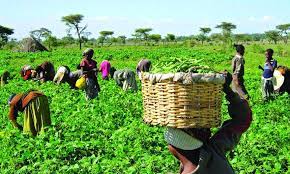Ganiyu Obaaro
The initial euphoria that greeted the setting up in 2015, of the Agricultural Anchor Borrowers’ Programme, ABP, by the Federal Governments of Nigeria, in collaboration with other relevant institutions, including the Central Bank of Nigeria, banks and farmers, has suddenly evaporated.
No thanks to various institutional challenges, corruption, insecurity, farmers’ attitude and poor implementation that brought it to its knees.
In retrospect, agriculture, has, from time immemorial, remained Nigeria’s main occupation, employing as it were, over 75 per cent of our people, and generating highest local and foreign revenues.
The farmers were mostly small-scale holders, until the dramatic coming of crude oil, which has since become our main foreign exchange earners, especially from the 1970s till date.
In order to rejuvenate agriculture, various intervention programmes had been embarked upon by the Federal Government of Nigeria.
They included, seed multiplication schemes, River Basin Development Authorities, RBDA, and loans’ advancement to farmers, small, middle and large scale to increase food production, generate more foreign earnings and enhance the overall welfare of the people.
The introduction of ABP, therefore, is considered another significant effort to change the face of the sector for good.
Indeed, the core objectives of the ABP, as enunciated in particular, by its midwife, CBN, are, among other issues, “to create economic linkages between smallholder farmers and reputable companies involved in agricultural value chain; to provide loans to small smallholders’ farmers to boost agricultural production, which for years, had suffered undeserved neglect, reduce import food bill and conserve foreign exchange.”
Through Section 31 of the CBN’s Act, 2017, the ABP got the desired legal teeth to operate.
Its modus operandi involved effective collaboration with the Federal Ministry of Agriculture and Rural Development, agro processors, commodity associations, state governments, small farmers holders and financial institutions, like Deposit Money Banks and Microfinance Banks.
The programme also targeted commodities like, cassava, cotton, oil palm, cocoa, yam, roots, whose producers are given loans with repayment system either personally, by cash, or through their associations, who are their collateral providers.
President Muhammadu Buhari, who inaugurated the programme in 2015, with great optimism, said then that over 4.8 million farmers were financed.
Buhari said before the coming on board of the programme, Nigeria’s average rice production between 1999-2015, was less than four metric tonnes annually; but it rose to 4.5 mmt in 2016; 5.0 in 2017.
He said the development ranked Nigeria as the 14th rice producer globally.
However, these gains soon evaporated due to a number of factors.
Analysts say that, despite government’s claim of increase in food production, several factors militated against thereby proving it otherwise.
Some of these factors include, many of those who collected loans, used it to marry more wives, built houses and bought cars instead of investing it on Agric production.
There are also cries by Nigerians that apart from the big-time farmers hijacking the loans, prices of rice and other commodities had been on the rise, thus eroding the farmers’ gains.
For the Managing Director of Labaran Rice Mill, Abdullahi Zuru, the astronomical rise of 50 kg bag of rice from then N20,000-N25,000, before hitting about N40,000 for two years now, was due to smuggling, insurgency, farmers/ herders’ clashes.
In fact, uncontrolled smuggling activities across Nigeria’s porous borders, have been having negative effects on local rice production. While the smugglers smile to the banks, local producers continue to lament over their losses.
Other factors identified include corruption, connivance of big-time farmers with top civil servants and disappeared with the money untraced, as well as flooding, which swept away farmlands, making farmers lose their investments.
Beyond these, experts advise that ABP should be revitalsed to boost its operations and increase its gains.
They regretted that since 2021, the programme had been in the limbo, with no disbursement at all to farmers.
The government has also been advised to smoothen its collaborative strategies with the states and tame insecurity across the country to allow unhindered socio-economic activities to take place and increase the Gross Domestic Product, GDP.
Recall that Nigeria has been battling against insecurity-insurgents, Boko Haram, bandits-who maim, kill farmers and other Nigerians at will.
Nigerians are hoping that the incoming administration will reverse the growing trend.








More Stories
Tinubu sacks NNPCL CEO Mele Kyari, replaces him with ex-Shell MD, Ojulari
Customs commences implementation of zero tax on imported pharmaceutical inputs for two years
NNPC’s termination of Naira for crude deal with Dangote heightens FX demand, as Naira weakens